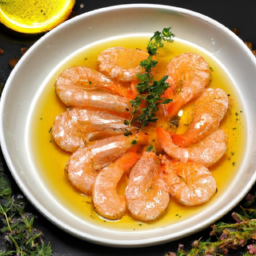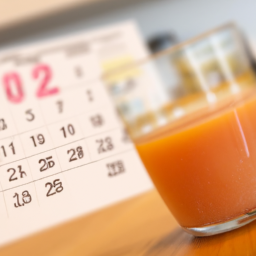As a seafood enthusiast, I am always looking for new ways to elevate the flavor and depth of my dishes. Shrimp, with their delicate texture, truly shine when paired with a delicious marinade, enhancing their culinary charm. Through my culinary experiments, I have found that marinating shrimp in lemon juice requires some careful attention.
How long should you let the shrimp soak? And what are the risks of over-marinating? In this article, I’ll share my tips and tricks for achieving the perfect balance of flavor and texture when marinating shrimp in lemon juice.
One experience that taught me the importance of getting the marinating time right was the time I left a batch of shrimp in lemon juice for too long. I had read that lemon juice can tenderize shrimp, but I had no idea just how quickly it could break down the delicate flesh. When I pulled the shrimp out of the marinade, they were mushy and practically falling apart.
It was a disappointing and costly mistake, and one that I don’t want anyone else to make. So, let’s dive into the science of shrimp marinades and explore the ideal marinating time for shrimp in lemon juice.
Key Takeaways
- Marinate shrimp in lemon juice for 15-30 minutes to tenderize them and break down proteins.
- The ratio of lemon juice to oil in the marinade should be 1:3 to balance the flavor.
- Adding garlic, herbs, or spices can enhance the taste of the shrimp.
- Overcooking the shrimp can result in a rubbery texture, so it’s essential to cook them correctly.
The Importance of Lemon Juice in Shrimp Marinades
Lemon juice isn’t just a tangy addition to shrimp marinades, it actually plays a crucial role in tenderizing the seafood. The benefits of acidic marinades cannot be overstated, as they help break down the proteins in the shrimp, making it more tender and easier to digest.
In addition, lemon juice adds a bright, fresh flavor that complements the briny taste of the shrimp. When creating a balanced marinade, it’s important to keep in mind the acidity level of the lemon juice. Too much acid can overpower the delicate flavor of the shrimp, while too little won’t have the desired tenderizing effect.
A good rule of thumb is to use a ratio of one part acid (lemon juice) to three parts oil (such as olive oil) in the marinade. This will create a balanced flavor profile and ensure that the shrimp is properly tenderized.
Now that we understand the benefits of using lemon juice in shrimp marinades, let’s explore how lemon juice affects shrimp and how long it can be marinated for optimal results.
How Lemon Juice Affects Shrimp
The tangy acidity of lemon juice brings out the best flavors in succulent shrimp, leaving you craving for more. Lemon juice is a popular choice for marinating shrimp due to its distinct taste and numerous benefits.
The high acidity of lemon juice helps to break down the proteins in the shrimp, resulting in a more tender texture. It also enhances the natural sweetness of the shrimp, making it a perfect complement to any dish. Aside from its impact on the texture and taste of shrimp, lemon juice also offers potential health benefits.
It’s a great source of vitamin C, which can help boost the immune system and promote healthy skin. However, it’s important to note that raw marinated shrimp can pose potential health risks due to the presence of harmful bacteria. Therefore, it’s crucial to handle and prepare shrimp properly to prevent foodborne illness.
Understanding the delicacy of shrimp is key to ensuring a safe and delicious meal. It’s important to follow proper food safety guidelines when handling and preparing shrimp, such as washing hands and utensils thoroughly and cooking shrimp to the appropriate temperature. By doing so, you can enjoy the benefits of citrus, acidity, and texture in shrimp marination while minimizing the risks of consuming raw marinated shrimp.
Understanding the Delicacy of Shrimp
Handling and preparing shrimp properly is crucial for ensuring a safe and delectable meal. Shrimp are a delicate protein source, and overcooking or under-seasoning can lead to an unappetizing dish.
There are a variety of cooking techniques and seasoning options available to enhance the natural flavor of shrimp. Here are four techniques that can turn a simple shrimp dish into a mouth-watering delicacy:
- Grilling shrimp on skewers with lemon and garlic
- Pan-frying shrimp with Cajun seasoning and butter
- Poaching shrimp in white wine with bay leaves and thyme
- Baking shrimp in a foil packet with olive oil, tomatoes, and basil
Each of these techniques offers a unique flavor profile and texture to the shrimp. By experimenting with different cooking techniques and seasonings, you can elevate the humble shrimp to a gourmet dish.
As delicious as shrimp can be, there are still risks associated with over-marinating them in lemon juice. While marinating shrimp in lemon juice can impart a tangy flavor and tenderize the meat, leaving them in the marinade for too long can cause the shrimp to become mushy and even disintegrate.
To avoid this, it’s important to follow proper marinating guidelines and not exceed the recommended time. In the next section, we’ll delve into the risks of over-marinating shrimp and how to prevent them.
The Risks of Over-Marinating Shrimp
I’ve learned that marinating shrimp in lemon juice can add a zesty flavor to the dish. However, it’s important to not over-marinate as it can have negative effects on the texture and taste of the shrimp.
Over-marinating can result in tough and rubbery shrimp, and it can also mask the natural flavors of the shrimp.
Tough and Rubber Shrimp
You don’t want to end up with tough and rubbery shrimp, do you? Over-marinating shrimp in lemon juice can result in a rubbery texture that is less than desirable.
Here are some tips on how to avoid this problem:
- Use fresh shrimp: The fresher the shrimp, the less likely it is to turn rubbery. Avoid frozen shrimp, as they’ve already been soaked in water, making them more prone to rubbery texture.
- Marinate for the right amount of time: Shrimp should only be marinated in lemon juice for 15-30 minutes. Any longer than that can cause the shrimp to become tough and rubbery.
- Use a combination of lemon juice and other ingredients: Adding other ingredients such as garlic, herbs, or spices to the marinade can help to overcome any negative effects on flavor caused by the lemon juice.
- Cook the shrimp properly: Overcooking shrimp can also lead to a rubbery texture. Cook the shrimp just until it turns pink and curls up, then immediately remove it from the heat.
Over-marinating shrimp in lemon juice can be detrimental to its texture and flavor. In the next section, we’ll explore the negative effects on flavor that can occur when shrimp is marinated for too long.
Negative Effects on Flavor
If you’re looking to savor the taste of succulent shrimp, be wary of zesting up the marinade for too much of a good thing. Overuse of acid, like lemon juice, can actually have a negative impact on the flavor of your shrimp.
While a little bit of acid can help tenderize the shrimp and add a bright tanginess to the flavor, too much acid can make the shrimp tough and rubbery. Additionally, over-marinating can cause the shrimp to become mushy and lose their natural sweetness.
However, fear not, there are other acidic marinade options that can still provide a tasty and tender result without the negative effects on flavor. Vinegar-based marinades, for example, can offer a similar tenderizing effect as lemon juice but with a milder flavor profile.
Finding the perfect balance of flavor and texture is all about experimenting with different marinades and cooking techniques to see what works best for your taste buds.
Finding the Perfect Balance of Flavor and Texture
Achieving the ideal balance of flavor and texture is key when marinating shrimp in lemon juice. Balancing acidity and texture is crucial to ensure that the shrimp is not overpowered by the tanginess of the lemon juice.
One way to achieve this is by experimenting with herbs such as thyme, parsley, and basil. These herbs not only add flavor but also help to balance out the acidity of the lemon juice.
When marinating shrimp in lemon juice, it’s important to pay attention to the texture of the shrimp. Over-marinating can result in a tough and rubbery texture, while under-marinating can leave the shrimp bland and lacking in flavor.
It’s all about finding the sweet spot, where the shrimp has absorbed enough of the lemon juice and herbs to enhance its flavor, but not so much that it becomes tough. So, how long is the ideal marinating time for shrimp in lemon juice? Let’s find out in the next section.
The Ideal Marinating Time for Shrimp in Lemon Juice
I’ve tried and tested marinating shrimp in lemon juice countless times, and I’ve learned that the ideal marinating time is 30 minutes to an hour.
During this time, the shrimp absorbs the lemon’s zesty and tangy flavors without overcooking.
It’s essential to keep an eye on the shrimp while marinating to avoid overcooking, which can result in a rubbery texture.
30 Minutes to an Hour
Marinating shrimp in lemon juice for just 30 minutes can add a refreshing and tangy flavor to your dish. As someone who loves experimenting with different acids in my marinades, I find that citrus marinades are particularly effective in enhancing the natural sweetness of shrimp.
Not only does the lemon juice add flavor, but it also helps to tenderize the shrimp, making it more succulent and juicy. However, marinating shrimp in lemon juice for too long can lead to overcooking and a tough, rubbery texture.
That’s why I recommend marinating for no more than an hour, as this is enough time for the shrimp to absorb the flavors without being overpowered by the acidity of the lemon juice. With this method, you can achieve a perfect balance of tangy and sweet flavors, while also ensuring that the shrimp remains tender and juicy.
Absorbing Flavors Without Overcooking
To make sure your shrimp is tender and flavorful, it’s important to find the perfect balance of marination time and acidity. When using lemon juice as a marinade, it’s important to remember that shrimp can quickly become overcooked and tough if left in the acidic liquid for too long.
To avoid this, consider the following marinating techniques:
-
Use a small amount of lemon juice and marinate for a short period of time, no more than 30 minutes.
-
Combine the lemon juice with another liquid, such as olive oil or white wine, to dilute the acidity and allow for longer marination times.
-
Marinate the shrimp in a sealed plastic bag, removing as much air as possible to ensure the marinade is in constant contact with the shrimp.
These techniques will help prevent overcooking while still allowing for optimal flavor infusion. However, it’s important to consider other factors when creating a shrimp marinade.
Other Factors to Consider in Shrimp Marinades
When you’re considering other factors in shrimp marinades, remember that the acidity level of lemon juice can actually begin to cook the shrimp if left too long, so it’s best to limit marinating time to 30 minutes to an hour. This is especially important if you’re using raw shrimp, as over-marinating can result in a tough and rubbery texture. If you’re looking for a longer marinating time, you may want to consider using a different ingredient, like lime juice or vinegar, which have lower acidity levels and won’t have the same cooking effect on the shrimp.
Pairing options are also an important factor to consider when creating a shrimp marinade. Shrimp pairs well with a variety of flavors, including garlic, ginger, soy sauce, and cilantro. When choosing ingredients, think about the overall flavor profile you want to achieve and how the ingredients will work together.
For example, if you’re going for a spicy marinade, consider adding chili flakes or hot sauce, but be mindful not to overpower the delicate flavor of the shrimp. With the right pairing and marinating time, you can create a delicious and flavorful shrimp dish that will impress your guests.
When it comes to achieving the perfect shrimp marinade, there are a few tips to keep in mind. One key tip is to not overdo it with the marinade. While it may be tempting to pour on a lot of marinade to really infuse the shrimp with flavor, this can actually be counterproductive. Instead, aim for a balanced ratio of marinade to shrimp, and make sure to evenly coat each piece. Additionally, be sure to properly season your marinade with salt and pepper to enhance the overall flavor.
With these tips in mind, you’ll be able to create a delicious and perfectly marinated shrimp dish.
Tips for Achieving the Perfect Shrimp Marinade
If you want to achieve the perfect shrimp marinade, you’ll need to keep a few tips in mind. First, choose the right marinade ingredients. Lemon juice is a great option for shrimp, but you can also experiment with other acidic liquids like vinegar or wine. Don’t forget to add some oil to the mix to help the flavors penetrate the shrimp. Garlic, herbs, and spices can also enhance the taste of your marinade.
Second, consider the cooking method you will use. Grilling, sautéing, and broiling are all great options for cooking marinated shrimp. If you’re grilling, make sure to preheat your grill and brush the grates with oil to prevent sticking. For sautéing, use a non-stick pan and cook the shrimp over medium-high heat until they turn pink and opaque.
With these tips in mind, you’ll be able to create a perfectly marinated and cooked shrimp dish.
When it comes to alternative marinades for shrimp, there are plenty of options to choose from. In the next section, we’ll explore some creative ways to marinate shrimp and add new flavors to your cooking.
Alternative Marinades for Shrimp
Looking for ways to spice up your shrimp marinade game? Try using coconut milk to add a creamy twist to your dish!
One of my favorite recipes involves marinating the shrimp in a mixture of coconut milk, lime juice, and chili powder before grilling them to perfection. The coconut milk adds a smooth and sweet flavor that complements the tanginess of the lime juice and the spiciness of the chili powder. Plus, the high fat content in the coconut milk helps the shrimp retain its moisture, resulting in tender and juicy grilled shrimp.
If you’re not a fan of creamy marinades, you can also try experimenting with citrus marinades. Citrus fruits like lemon, lime, and orange can add a refreshing and zesty flavor to your shrimp.
To make a basic citrus marinade, combine fresh citrus juice with olive oil, garlic, salt, and pepper. You can also add herbs like thyme, rosemary, or cilantro for extra flavor.
Marinate the shrimp for at least 30 minutes before grilling, and you’ll have a delicious and healthy meal in no time!
Frequently Asked Questions
How do you properly clean and devein shrimp before marinating them in lemon juice?
To properly clean and devein shrimp, first rinse them in cold water and remove the shell and tail. Using a sharp knife, cut along the back and remove the vein. Marinate with lemon juice for added flavor.
Can you use bottled lemon juice instead of fresh lemon juice for shrimp marinades?
When it comes to shrimp marinades, fresh lemon juice is always better than bottled. The acidity levels and flavor profile are more balanced, creating a better taste. Using an idiom, it’s like comparing apples to oranges.
What are some other ingredients that pair well with lemon juice in shrimp marinades?
I love using lemon juice in my shrimp marinades because it adds a bright, fresh flavor. Other ingredients that pair well with lemon juice include garlic, herbs like parsley and thyme, and spicy peppers. Alternatively, you could try using other acidic marinades like vinegar or lime juice.
Can you freeze marinated shrimp for later use?
Can you freeze marinated shrimp? Yes, I often freeze my marinated shrimp for later use. To defrost, place the shrimp in the fridge overnight, or run under cold water. Avoid defrosting in the microwave to prevent overcooking.
How can you tell when shrimp has been marinated for too long and is no longer safe to eat?
When marinating shrimp, be aware of signs of spoilage such as a slimy texture or off smell. Proper storage is key; keep refrigerated at all times and consume within 2 days of marinating.
Conclusion
So there you have it, folks! The perfect marinating time for shrimp in lemon juice is a delicate balance between flavor and texture. Too short of a time and you won’t achieve the full effect of the lemon juice, too long and you risk ruining the delicate shrimp.
But fear not, with the right techniques and tips, you can achieve the perfect shrimp marinade every time. And let me tell you, when you nail that perfect balance, your taste buds will be in for a treat!
The tangy, citrusy flavor of the lemon juice combined with the succulent texture of the shrimp will make your mouth water for more. So go ahead, indulge in the art of shrimp marinating and take your taste buds on a flavor journey they won’t forget!









